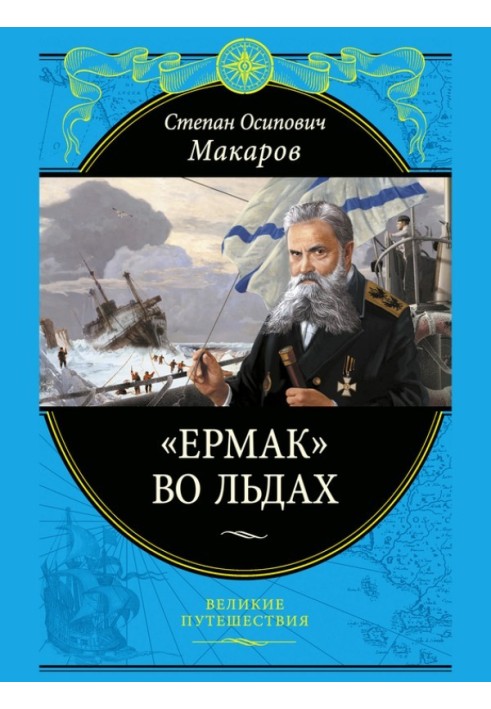"Ermak" in the ice
 Instant download
Instant download
after payment (24/7)
 Wide range of formats
Wide range of formats
(for all gadgets)
 Full book
Full book
(including for Apple and Android)
A truly great personality rarely fits into the framework of his biography. The outstanding Russian naval sailor Admiral Stepan Osipovich Makarov (1849-1904) was cramped everywhere - on land and at sea. His life motto was: “At sea - at home, on the shore - as a guest.” He set out on his first voyage at the age of twelve - and devoted forty-three years of his life, until his heroic death, to the Russian fleet. A tireless navigator, a major naval commander, a profound scientist, a talented inventor, an outstanding organizer, an extraordinary writer - he made an invaluable contribution to everything he undertook. Here is the shortest list of his achievements. He created the theory of unsinkability and survivability of a ship - and put it into practice, proposing to make the bottom and sides of ships double and divide the ship's hull into waterproof compartments. He invented a plaster for sealing holes, an armor-piercing cap-tip for shells and the Russian semaphore alphabet. He was the first in the Russian fleet to use self-propelled torpedoes in battle. Having circumnavigated the world, he published a two-volume work “Vityaz and the Pacific Ocean,” which brought him world fame as an oceanographer, a prize from the Russian Academy of Sciences and a Gold Medal from the Russian Geographical Society. As a military sailor, Makarov is best characterized by his own words: “My rule : if you meet a weaker ship, attack, if it’s equal to you, attack, and if it’s stronger than you, attack too.” Admiral Makarov is the only Russian naval commander who had the opportunity to serve in all four fleets of the empire: the Baltic, Black Sea, Pacific and Severn, which he, in fact, created. Makarov gained the deepest respect and devoted love not only of the sailors, but of everyone with whom fate brought him together - from the holy righteous John of Kronstadt to the legendary liberator of the Balkans, General Skobelev, with whom they fraternized, exchanging St. George's crosses. And also stern, battle-hardened and During his campaigns, the admiral was a dreamer and romantic. And his main idea, his great dream, was to reach the North Pole on an icebreaker. “Towards the North Pole – all the way” was the title of the lecture he gave in 1897 at the Russian Imperial Geographical Society. A dream that came true only 80 years later, when the nuclear icebreaker Arktika reached the North Pole of the planet. But the beginning was made by this performance and the beloved brainchild Admiral: the world's first Arctic-class icebreaker "Ermak". They say that no one is irreplaceable. And yet, hope dies last. Sometimes it happens exactly the opposite: hope disappears with the death of someone who turns out to be irreplaceable... Of course, this book could contain only a small part of the rich literary heritage of the legendary Russian admiral. The book is based on Makarov’s main work, “Ermak in the Ice,” a story about the ice voyages of the world’s first Arctic-class icebreaker, Makarov’s favorite brainchild. The publication is supplemented by other publications of the famous admiral, enriching our understanding of the author’s personality and the breadth of his interests. The electronic publication includes all the texts of S. O. Makarov’s paper book and basic illustrative material. But for true connoisseurs of exclusive publications, we We offer a gift classic book. Beautiful offset paper, dozens of color and more than 200 black and white illustrations not only decorate the book - they help answer the question: what is so unusual, attractive and magical in the harsh, inhospitable world of the Arctic that so attracts brave researchers. This edition, like all books in the Great Journeys series, is printed on beautiful offset paper and elegantly designed. Editions of the series will adorn any, even the most sophisticated library, and will be a wonderful gift for both young readers and discerning bibliophiles.
Data sheet
- Name of the Author
- Степан Макаров Осипович
- Language
- Russian













